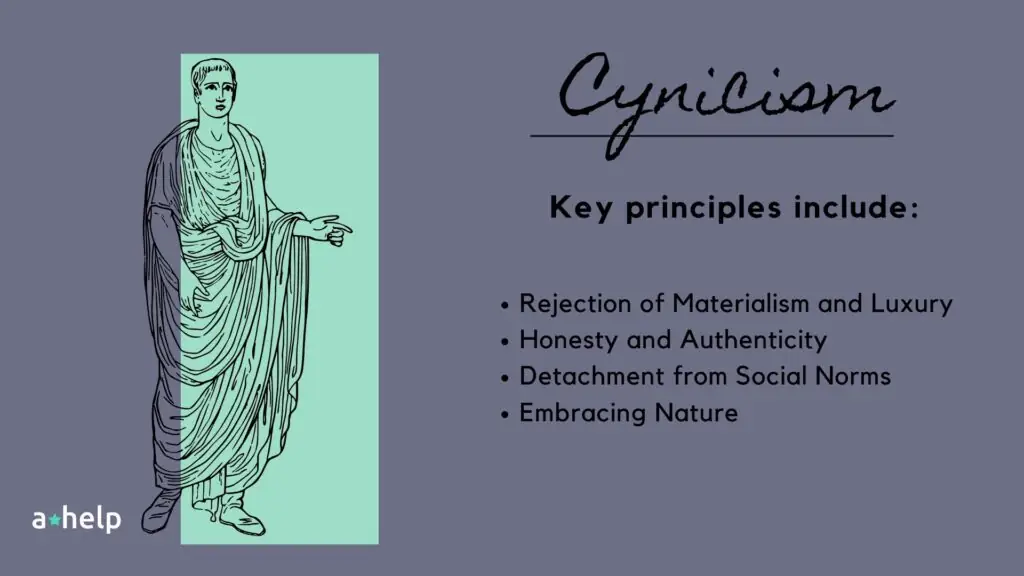Diogenes of Sinope, a Greek philosopher born in the 4th century BCE, is remembered not only for his unconventional lifestyle but also for his profound philosophical wisdom. As one of the founders of Cynicism, Diogenes left behind a legacy of insightful quotes that continue to inspire and provoke thought. He championed principles of living in virtue in agreement with nature, eschewing societal conventions and material excess in pursuit of a life marked by self-sufficiency, austerity, and shamelessness. In this article, we will look into the life and principles of Diogenes and explore the philosophy of Cynicism through his famous quotes.

✅ AI Essay Writer ✅ AI Detector ✅ Plagchecker ✅ Paraphraser
✅ Summarizer ✅ Citation Generator
A Brief Biography of Diogenes
Diogenes was born in Sinope, a city on the coast of the Black Sea, around 412 or 404 BCE. Little is known about his early life, but his philosophical journey would later lead him to Athens, where he would become a prominent figure. Diogenes’ rejection of materialism was evident from an early age when he chose a life of simplicity and minimalism.
One of the defining moments in Diogenes’ life was his encounter with Alexander the Great. When asked if there was anything Alexander could do for him, Diogenes replied with his famous quote,
“Stand out of my light.”
This simple response encapsulated his disdain for power, wealth, and worldly desires.
The Philosophy of Diogenes
Cynicism, as adopted by Diogenes, centered on the rejection of conventional norms and the pursuit of virtue and wisdom. Diogenes believed that true happiness could be found not in wealth or social status, but in living in harmony with nature and embracing a simple, ascetic lifestyle.

Rejection of Materialism and Luxury
Diogenes firmly believed that genuine wealth stemmed from finding contentment in simplicity. He rejected the conventional pursuit of material possessions and luxury, which he saw as pathways to spiritual destitution. Instead, he advocated for leading a life marked by frugality and self-sufficiency. According to him, true riches lay not in accumulating worldly goods, but in appreciating the fundamental pleasures of life that do not depend on external wealth.
Honesty and Authenticity
Honesty stood as the cornerstone of Diogenes’ philosophy. He held that living a virtuous life necessitated complete transparency and authenticity. One of his famous quotes we include below is dedicated to the importance of leading an unpretentious and virtuous life.
“Blushing is the color of virtue,”
Diogenes believed that genuine virtue emerged from living honestly and without pretense, free from the trappings of deception or hypocrisy.
Detachment from Social Norms
Diogenes was notorious for challenging societal norms and conventions. His assertion that
“The foundation of every state is the education of its youth”
highlights his belief in the critical importance of nurturing young minds to think independently and question established authority. He saw the youth as the basis of any society and believed that fostering their ability to question and challenge norms was necessary for progress.
Embracing Nature
Diogenes urged individuals to embrace their innate instincts and desires. His renowned quote,
“What I like, I do; what I don’t like, I don’t do,”
is a testament to the significance of following one’s genuine desires rather than conforming to external expectations. Diogenes encouraged people to prioritize personal authenticity, embracing their true nature, and acting in accordance with their inner convictions rather than succumbing to societal pressures.
Famous Diogenes Quotes
Diogenes’ life and philosophy continue to inspire those who seek wisdom and a deeper understanding of the human condition. His quotes serve as timeless reminders of the importance of simplicity, authenticity, and virtue in a world often consumed by materialism and superficiality. Let’s talk about some of them.
“I am not an Athenian or a Greek, but a citizen of the world (cosmopolitan).”
Diogenes’ declaration of being a “cosmopolitan” reflects his belief in a universal identity transcending national or cultural boundaries. He emphasized that as human beings, we are all part of a larger global community, advocating for unity and shared humanity.
“The foundation of every state is the education of its youth.”
Diogenes stressed the vital role of education in the development of a just and prosperous society. He believed that nurturing the intellectual and moral growth of the younger generation was vital to building strong and enlightened states.
“I am looking for an honest man.”
The philosopher carried a lantern during the day, claiming to be searching for an “honest man” but never finding one. This satirical gesture illustrates his critique of the prevalent dishonesty and hypocrisy in society, highlighting his commitment to authenticity and integrity.
“Blushing is the color of virtue.”
Diogenes emphasized that a genuine sense of shame and embarrassment is a sign of virtue. He believed that those who can feel shame are more likely to act ethically and with humility.
“He has the most who is content with the least.”
This quote encapsulates Diogenes’ philosophy of minimalism and contentment. He believed that true wealth and abundance come from being satisfied with the simplest of things and not constantly pursuing material possessions.
“What I like, I do; what I don’t like, I don’t do.”
He also advocated for self-determination and authenticity in one’s actions. With this quote, the philosopher emphasizes the importance of following one’s genuine desires and convictions rather than succumbing to societal pressures or expectations.
“Poverty is a virtue which one can teach.”
Diogenes considered poverty as a moral virtue that could be cultivated and learned. He believed that by embracing a simple and unmaterialistic lifestyle, individuals could attain greater spiritual wealth and ethical fortitude.
“Dogs and philosophers do the greatest good and get the fewest rewards.”
The philosopher often compared himself to dogs, as he appreciated their simplicity and straightforwardness. In this quote, he suggests that both dogs and philosophers contribute significantly to society without seeking material rewards or recognition.
“The art of being a slave is to rule one’s master.”
Diogenes’ paradoxical statement challenges conventional notions of power and servitude. He viewed true freedom as coming from mastering one’s desires and not being enslaved by them, even in the face of external authority.
“As a matter of self-preservation, a man needs good friends or ardent enemies, for the former instruct him and the latter take him to task.”
Diogenes emphasized the value of honest feedback and criticism. According to him, both friends who provide guidance and enemies who challenge us play essential roles in personal growth and self-improvement.
Conclusion
Through the principles of Cynicism, as exemplified by Diogenes, we can find a path to true happiness and fulfillment, transcending the fleeting desires of the external world and embracing the richness of our inner selves. It is through introspection and challenging the status quo that we can truly grow as individuals and as a society, just as Diogenes did in his pursuit of Cynicism.
FAQ
Follow us on Reddit for more insights and updates.





Comments (0)
Welcome to A*Help comments!
We’re all about debate and discussion at A*Help.
We value the diverse opinions of users, so you may find points of view that you don’t agree with. And that’s cool. However, there are certain things we’re not OK with: attempts to manipulate our data in any way, for example, or the posting of discriminative, offensive, hateful, or disparaging material.